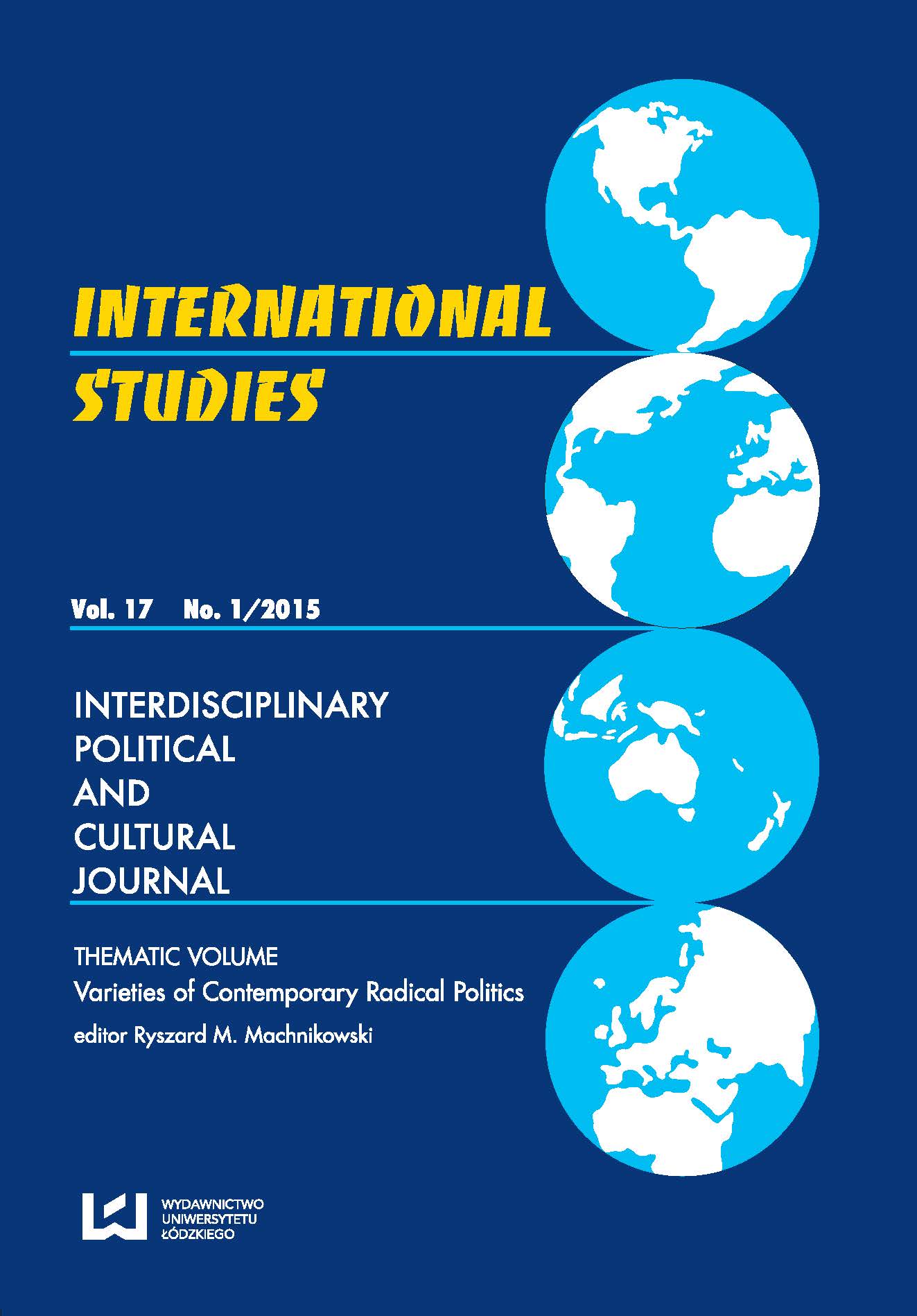Breaking the Waves: How the Phenomenon of European Jihadism Militates Against the Wave Theory of Terrorism
DOI:
https://doi.org/10.1515/ipcj-2015-0007Keywords:
the Wave theory of terrorism, the Fourth Wave terrorism, European homegrown jihadists, critiqueAbstract
David Rapoport’s Wave theory of terrorism is one of the most oftencited theories in the literature on terrorist violence. Rapoport is praised for having provided researchers with a universal instrument which allows them to explain the origin and transformation of various historical types of terrorism by applying to them the concept of global waves of terrorist violence driven by universal political impulses. This article, testing the Wave theory against the recent phenomenon of homegrown jihadism in Europe, uncovers this theory’s fundamental weaknesses and questions its real academic and practical value.
Downloads
References
Coogan, T. P., The IRA. New York: Palgrave, 2002.
Google Scholar
Copeland, T., “Is the ‘New Terrorism’ really new? An Analysis of the New Paradigm for Terrorism.” The Journal of Conflict Studies XXI.2 (2001): 7-27.
Google Scholar
Crenshaw, M., “The Debate over ‘New’ vs. ‘Old’ Terrorism.” Values and Violence: Intangible Aspects of Terrorism. Eds. I. Karawan, W. McCormack, S. Reynolds. Dordrecht: Springer, 2008.
Google Scholar
Critical Terrorism Studies: A New Research Agenda. Ed. R. Jackson. Abingdon: Routledge, 2009.
Google Scholar
Drissel, D., “Online Jihadism for the Hip-Hop Generation: Mobilizing Diasporic Muslim Youth in Cyberspace.” The International Journal of Interdisciplinary Social Sciences 2.4 (2007): 7-19.
Google Scholar
Gupta, D., Understanding Terrorism and Political Violence. Abingdon: Routledge, 2008.
Google Scholar
Hoffman, B., Inside Terrorism. New York: Columbia University Press, 2006.
Google Scholar
Islam in Europe. Web. 25 January 2015. http://www.economist.com/blogs/graphicdetail/2015/01/daily-chart-2
Google Scholar
Kaplan, J., “Leaderless Resistance.” Inside terrorist organizations. Ed. D. C. Rapoport. London: Frank Cass, 2001.
Google Scholar
Lesser, I. O., et. al., Countering the new terrorism. Santa Monica: RAND, 1999.
Google Scholar
McAllister, Bradley, and Alex P. Shmid, “Theories of Terrorism.” The Routledge Handbook of Terrorist Research. Ed. A. P. Shmid. Abingdon: Routledge, 2011.
Google Scholar
Networks, Terrorism and Global Insurgency. Ed. R. Bunker. Abingdon: Routledge, 2005.
Google Scholar
Neumann, P., Old and New Terrorism: Late Modernity, Globalization and the Transformation of Political Violence. Cambridge: Polity Press, 2009.
Google Scholar
Rapoport, D. C., “Fear and Trembling: Terrorism in Three Religious Traditions.” The American Political Science Review 78.3 (1984): 658-677.
Google Scholar
Rapoport, D. C. “The Fourth Wave: September 11 in the History of Terrorism.” Current History: A Journal of Contemporary World Affairs 100.650 (2001): 419-425.
Google Scholar
Rapoport, D. C. “The Four Waves of Modern Terrorism.” Terrorism: Critical Concepts in Political Science. Vol. 4. The fourth or religious wave. Ed. D. C. Rapoport. Abingdon: Routledge, 2006.
Google Scholar
Root Causes of Terrorism: Myths, reality and ways forward. Ed. T. Bjørgo. Abingdon: Routledge, 2005.
Google Scholar
Sageman, M., Leaderless Jihad: Terror Networks in the Twenty-First Century. Philadelphia: University of Pennsylvania Press, 2008.
Google Scholar
Sageman, M. “Ripples in the waves: fantasies and fashions.” Terrorism, Identity and Legitimacy: The Four Waves theory and political violence. Ed. J. Rosenfeld. Abingdon: Routledge, 2011.
Google Scholar
Simon, J., “Technological and lone operator terrorism: prospects for a Fifth Wave of global terrorism.” Terrorism, Identity and Legitimacy: The Four Waves theory and political violence. Ed. J. Rosenfeld. Abingdon: Routledge, 2011.
Google Scholar
Smith, P., “Fourth Wave of terrorism and the International System.” Diss. The University of Hawaii, 2005. Print.
Google Scholar
Terrorism: Critical Concepts in Political Science. 4 vols. Ed. D. C. Rapoport. Abingdon: Routledge, 2006.
Google Scholar
Terrorism, Identity and Legitimacy: The Four Waves theory and political violence. Ed. J. Rosenfeld. Abingdon: Routledge, 2011.
Google Scholar
Tucker, D., “What is New about the New Terrorism and How Dangerous is It?” Terrorism and Political Violence 14.3 (2001): 1-14.
Google Scholar
Understanding Violent Radicalization: Terrorist and Jihadist Movements in Europe. Ed. M. Ranstorp. Abingdon: Routledge, 2010.
Google Scholar
Wilkinson, P., Terrorism versus Democracy: The liberal state response. Abingdon: Routledge, 2011.
Google Scholar
Values and Violence: Intangible Aspects of Terrorism. Eds. I. Karawan, W. McCormack, S. Reynolds. Dordrecht: Springer, 2008.
Google Scholar
Venhaus, J., “Why Youth Join al-Qaeda.” United States Institute for Peace. Special Report 236 (May 2010): 1-20
Google Scholar
Warner, Carolyn, and Manfred Wenner, “Religion and the Political Organization of Muslims in Europe.” Perspectives on Politics 4.3 (2006): 457-479.
Google Scholar
Zanini, Michele, and Sean Edwards, “The Networking of Terror in the Information Age.” Networks and Netwars. Eds. J. Arquilla, D. Ronfeldt. Santa Monica: RAND, 2001.
Google Scholar
Прошин, Д., “Волны на мелководье: Критика волновой теории трансформации терроризма.” Ученые записки Таврического национального университета [Proshyn, D. “Waves in shallow water: a critique of the wave theory of the transformation of terrorism.” Scholarly papers of Taurida National University] 27.1 (2014): 261-269.
Google Scholar
Downloads
Published
How to Cite
Issue
Section
License

This work is licensed under a Creative Commons Attribution-NonCommercial-NoDerivatives 4.0 International License.

















